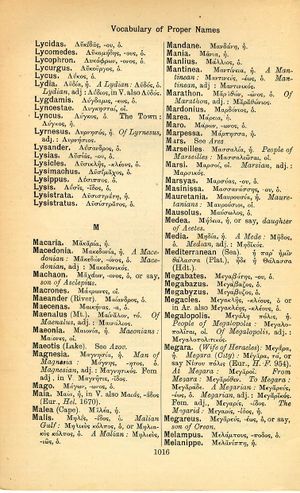Lysippus
καὶ ἤδη γε ἄπειμι παρὰ τὸν ἑταῖρον Κλεινίαν, ὅτι πυνθάνομαι χρόνου ἤδη ἀκάθαρτον εἶναι αὐτῷ τὴν γυναῖκα καὶ ταύτην νοσεῖν, ὅτι μὴ ῥεῖ. ὥστε οὐκέτι οὐδ' ἀναβαίνει αὐτήν, ἀλλ' ἄβατος καὶ ἀνήροτός ἐστιν → and now I depart for my companion, Cleinias since I have learned that for some time now his wife is unclean and she is ill because she does not flow, therefore he no longer sleeps with her but she is unavailable and untilled
English > Greek (Woodhouse)
Λύσιππος, ὁ.
Latin > English (Lewis & Short)
Lȳsippus: i, m., = Λύσιππος,
I a celebrated brass-founder of Sicyon, to whom alone Alexander the Great gave permission to cast a statue of him, Cic. Fam. 5, 12, 7; id. Brut. 86, 296; Hor. Ep. 2, 1, 240; Plin. 7, 37, 38, § 125; 34, 7, 17, § 37; Quint. 12, 10, 9.
Latin > French (Gaffiot 2016)
Lȳsippus,¹⁴ ī, m. (Λύσιππος), Lysippe [célèbre sculpteur, contemporain d’Alexandre le Grand] : Cic. Br. 296 ; Hor. Ep. 2, 1, 240.
Latin > German (Georges)
Lȳsippus, ī, m. (Λύσιππος), ein berühmter Bildhauer aus Sikyon, Zeitgenosse Alexanders des Gr., der nur von ihm in Erz gegossen sein wollte, Cic. Brut. 296. Hor. ep. 2, 1, 240. Prop. 3, 9, 9. Quint. 12, 10, 9. Plin. 7, 125 u. 34, 37.

